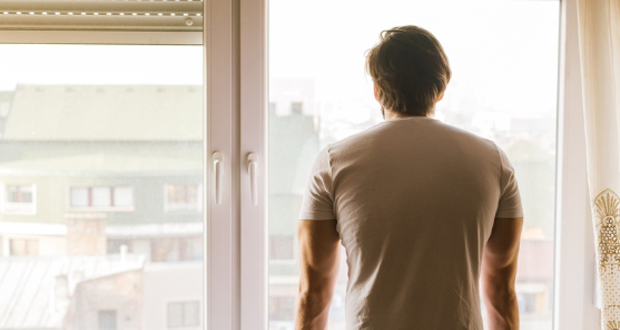5 Ways to Care for Your Mental Health During Coronavirus
It’s hard to escape the rising tide of emotion and mental health issues around COVID-19, which the World Health Organization (WHO) declared a global pandemic on March 11, 2020. From sporting-event cancellations to school closures, large-scale changes are happening in real time, adding to feelings of uncertainty. But there are ways to stay calm during the coronavirus outbreak, flattening your personal anxiety curve to a manageable level and keeping your panic from peaking.
READ: Connecting With Mental Health: Online Resources
Start by selecting a credible outlet, or two, to be your trusted source(s) for updates, such as the Centers for Disease Control (CDC). Rather than gluing yourself to the TV or internet for news, consider limiting yourself to just one or two update checks a day — and not right before bed. That way you can stay informed without spiraling.
To further help you stay centered during these uncertain times, we’ve assembled some advice for keeping anxiety at bay from Happify’s team of clinicians, scientists, and meditation experts.
Tip #1: Stay Social, Virtually
“Social connections are widely known to be important to life satisfaction, but we often forget they’re a crucial buffer to anxiety and depression,” says Matt Sosnowsky, LICSW, a therapist and Happify’s manager of digital therapy. “In times like this, although a lot of things are largely out of our control, often we can still choose how we spend our time.”
Interactions with friends, family, and co-workers can help boost our mood and mental health, but with social distancing becoming the new norm, staying connected now may require a bit of extra planning — and Wi-Fi. Set regular communication dates with the people you miss most. Take stock of their various strengths so you know what to expect — some friends are good listeners, while others are better for comic relief. Talking on the phone is fine, but with video calls you can actually enjoy doing activities with your pals, such as following the same dinner recipe from separate kitchens.
If you sort of wish you were home alone — rather than cooped up with roommates, kids, parents, or a partner — take time for yourself, as needed. Wearing headphones, going into separate rooms, or mandating quiet times may help you create your own tranquil space, even in the most chaotic environment. When you need to vent, stick with the adults; when you need distraction, come up with playful activities, such as dress-up with the kids. When times get tough, practice patience and compassion.
Tip #2: Don’t Skimp on Sleep
You’re not the only one lying awake at 2 a.m. playing out multiple “what if” scenarios in your head. It can be difficult to drift off — and stay asleep — in times of stress. But it’s important to sleep in order to remain healthy and sharp. “Sleep deprivation has been shown to have a number of negative effects on the body and mind, including reduced positive emotion, increased fatigue, increased irritability, and difficulty with attention,” says Happify’s Director of DTx Product Design Jared Minkel, Ph.D., a clinical psychologist and behavioral sleep specialist.
To get the best sleep possible, Minkel suggests the following:
- Stick to a consistent wake time
- Stay active during the day. Set alarms to remind yourself to get off the couch and move.
- Avoid screens for at least 30 minutes before bed (this will limit exposure to blue light and to stress-triggering news stories, which can stir up anxiety and worry)
- Find your favorite wind-down activity, such as reading a book, doing gentle stretches, or listening to pleasant music. If you’d rather watch TV, find something light-hearted and pleasant, like a familiar rerun of Friends or Seinfeld.
Tip #3: Stay Active
Being cooped up for an extended period may make you feel like the only physical activity you can do is switching from sitting on the couch to lying in bed. But there are steps you can take, literally, to boost your activity — even during times of social distancing. One runner, who had been living under quarantine in Wuhan, China, logged 31 miles inside his cramped apartment, making about 6,250 laps, according to reports. While setting a personal-best indoor-distance record may not be your goal, you should aim to establish a fitness routine. Exercise is an important driver of endorphins, or feel-good hormones, says Happify Medical Director Murray Zucker, M.D., and can also ward off feelings of anxiety and help your immune system stay strong.
If you have a consistent exercise routine, keep it up, modifying it to work from home, suggests Zucker. This may mean clearing space in your living room for a yoga mat or using your stairs during running drills. If you don’t have a regular workout, explore the many streaming options available, like Zumba classes on YouTube and subscription-based yoga or Pilates classes. If there’s a workout you’ve been wanting to try but never had the time, now’s your chance. Doing so now can help you maintain good spirits and health. To stay motivated, set goals and rewards for yourself and consider coordinating remote workouts and comparing notes with a friend.
Tip #4: Remember to Breathe
During trying times, leaning into empathy and compassion can help us remember that we’re all in this together. “We are dependent on the good intentions and actions of others and we’re responsible for protecting and supporting one another,” says Sharon Salzberg, a meditation teacher and New York Times best-selling author. Loving-kindness meditation reminds us of this interconnectedness, and can help you feel less alone and fearful. (Try it for free in Sharon’s Happify track, “Real Happiness: The Meditation Transformation.”)
Ritualizing the simple act of conscious breathing can help you stop projecting anxiously into the future. “You can use certain signals, like your phone ringing or hitting ‘send’ on an email, to remember to take three breaths,” says Salzberg. A walking meditation can also bring you into the present moment, whether you’re covering ground outside or moving around your home. Just pay attention—with a very light level of awareness — to the most predominant sensations in your body, like the touch of your foot against the ground. When facing so much that is unknown, these simple, grounding acts can help you tap into and strengthen your inner resources and your ability to care for yourself and others.
Tip #5: Stick with a Schedule
With some businesses shutting down and others rolling out work-from-home policies, you may find yourself with days full of unscheduled time. Why does this sound like a vacation, but feel like a bit of a burden? “Schedule disruptions can be hard on everyone, especially for people with autism spectrum, ADHD, and bipolar disorder, where having a routine is a central part of functioning well,” says Acacia Parks, Ph.D., Happify’s chief scientist. “If you’re feeling more anxious due to the lack of regularity and structure, you have to be especially vigilant about creating and maintaining a new routine.”
To get started, use a calendar or blank page to map out any obligations in your day, such as meetings or deadlines. Then layer on basic activities, like meals, showering, walking the dog, and getting dressed. Finally, create a list of “free-time activities,” so you have options to choose from during downtime. These can include basics like catching up on podcasts, doing laundry, or cleaning the fridge. Be sure to also add on some of the things you’ve always said you would do, if only you had the time. Right now, if you find yourself with more free time than usual, why not start an elaborate arts-and-crafts project, resurrect that blog, or plant the vegetable garden of your dreams?
The lack of control that comes with periods of upheaval and instability can lead to feelings of anxiety and despair. Being mindful of habits that can make you feel worse, such as overindulging in food and alcohol, as well as exercising any of these tips, can help you navigate these tough times.
We know that many of you may be experiencing heightened levels of stress and anxiety during this time. While the Happify app and community are available to you 24/7, we’ll also strive to address your concerns and mental-health questions via articles like this and through our social media channels over the coming weeks. Email us at team@happify.com, or contact us on Instagram, Facebook, or Twitter, and look out for more free resources in the coming days and weeks. We’re in this together, and we’re here for you. If you are experiencing severe mental distress, please visit our Resources page.
–By Jessica Cassity | happify.com
Go here to visit the Topeka Health and Wellness Facebook page for local event notices, news and local announcements. To help us spread the word, and to continue seeing our posts on your Facebook feed, “Like” the page and then like or share a story now and then, so that they will keep showing up in your feed.






Pingback: Dreaming of Affection Amidst a Pandemic: Perspective from a Nurse - Topeka Health and Wellness